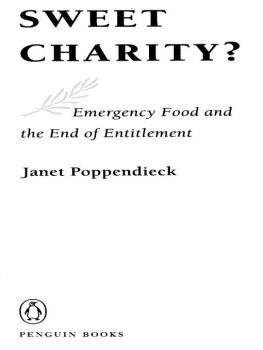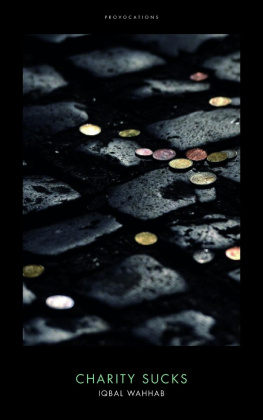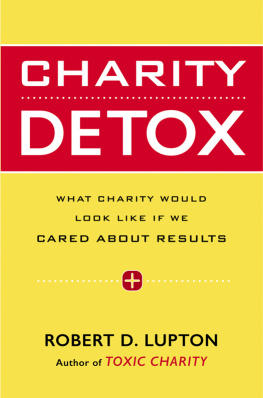Charity and Poverty in Advanced Welfare States
This book conceptualises the role of charity to people who are poor in wealthy countries and outlines a set of practical and conceptual ideas for how it could be reimagined.
Despite professionalised welfare states and strong economies, in many advanced industrialised nations, charity continues to play a major role in the lives of people who are poor. Extending what we know about how neoliberalism drives a decayed welfare state that outsources welfare provisioning to charities and community initiatives, this book asks how can we understand and conceptualise societys willingness to engage in charitable acts towards the poor, and how can charity be reimagined to contribute to justice in an unjust society? Through interrogating multiple data sources, including government datasets, survey datasets, media analyses, and ethnographic data, this book shows that charity is not well-suited to addressing the material dimension of poverty. It argues the need for a revised model of charity with the capacity to contribute to social solidarity that bridges social divisions and is inclusive of the poor. Presenting a model for reimaging charity which enables reciprocity and active contributions from recipients and providers, this book shows how power imbalances flowing from the unidirectional provision of charity can be reduced, allowing opportunities for reciprocal care that foster both well-being and solidarity.
This book will be of interest to all scholars and students of social policy, public policy, social welfare, sociology, and social work.
Cameron Parsell is Professor of the Social Sciences at The University of Queensland, Australia. He is the author of The Homeless Person in Contemporary Society. His research focuses on understanding the experience of poverty and what societies do to address it. With an Australian Research Council Future Fellowship, Camerons recent work examines charity and the Australian welfare state, with an aim of improving both.
Andrew Clarke is an urban sociologist and Research Fellow at The University of Queensland, Australia. He researches urban governance, homelessness, and other forms of housing-related poverty. Andrew has written on the networks of agencies, interventions, and policies that are assembled around urban problems, such as homelessness or antisocial behaviour, and the ways in which these can be reconfigured to better support disadvantaged people.
Francisco (Paco) Perales is Associate Professor of Sociology at The University of Queensland, Australia. His research uses longitudinal and life-course approaches and quantitative methods to enhance our understanding of social stratification in contemporary societies. Pacos recent work has concentrated on identifying the drivers of socio-economic inequalities by socio-economic background, gender, and sexual orientation within Australian society.
Routledge Advances in Health and Social Policy
Research and Evaluation in Community, Health and Social Care Settings
Experiences from Practice
Edited by Suzanne Guerin, Nirn Hayes and Sinead McNally
Critical Discourses of Old Age and Telecare Technologies
Gizdem Akdur
Aging Veterans with Disabilities
A Cross-National Study of Policies and Challenges
Arie Rimmerman
Creative Arts-Based Research in Aged Care
Photovoice, Photography, and Poetry in Action
Evonne Miller
Inciting Justice and Progressive Power
The Partnership for Working Families Cities
Edited by David Reynolds and Louise Simmons
Death, Grief and Loss in the Context of COVID-19
Edited by Panagiotis Pentaris
Charity and Poverty in Advanced Welfare States
Cameron Parsell, Andrew Clarke and Francisco Perales
For more information about this series, please visit: https://www.routledge.com/Routledge-Advances-in-Health-and-Social-Policy/book-series/RAHSP
First published 2022
by Routledge
2 Park Square, Milton Park, Abingdon, Oxon OX14 4RN
and by Routledge
605 Third Avenue, New York, NY 10158
Routledge is an imprint of the Taylor & Francis Group, an informa business
2022 Cameron Parsell, Andrew Clarke, and Francisco Perales
The right of Cameron Parsell, Andrew Clarke, and Francisco Perales to be identified as authors of this work has been asserted by them in accordance with sections 77 and 78 of the Copyright, Designs and Patents Act 1988.
All rights reserved. No part of this book may be reprinted or reproduced or utilised in any form or by any electronic, mechanical, or other means, now known or hereafter invented, including photocopying and recording, or in any information storage or retrieval system, without permission in writing from the publishers.
Trademark notice: Product or corporate names may be trademarks or registered trademarks, and are used only for identification and explanation without intent to infringe.
British Library Cataloguing-in-Publication Data
A catalogue record for this book is available from the British Library
Library of Congress Cataloging-in-Publication Data
A catalog record has been requested for this book
ISBN: 978-0-367-71381-2 (hbk)
ISBN: 978-0-367-71383-6 (pbk)
ISBN: 978-1-003-15057-2 (ebk)
Typeset in Times New Roman
by codeMantra
Introduction
It must be easy to point to a non-existent long term solution [to homelessness] that will likely never occur without legislation and government funding. Because [charitys] not THE perfect solution, it must [be] a waste of time, right? Do we have a responsibility to do better as a society? Absolutely. [Charity] is at least bringing awareness, visibility, and activism to the issue and starting conversations like this one. Or we can keep waiting around for someone else to make the perfect solution for us. That seems to be working wonders so far.
The problem is only the Government has the resources to provide this [affordable housing, adequate income], and they dont. Nor, it seems, do they have sufficient appetite to do so. Our national housing shortage has been growing for years. What the [charities] provide is short-term amelioration, not a long-term solution. Thats all thats within their reach. If I were on the street myself, Id be glad for their efforts.
Its easy to criticise [charity to the poor]. Harder to suggest an alternative.
These comments were posted to respond to a 2019 online news article written by the first author of this book (Parsell 2019). The comments speak to widely held public sentiment about the role and indeed value of charity as a response to poverty in contemporary and wealthy societies. Individual acts of charity towards people experiencing poverty, and collectively what charity is understood to represent for society, are widely perceived as necessary and positive. As Rose Lindsey and colleagues point out, voluntary charity is seen as a good in its own right, without the need for further scrutiny (Lindsey et al. 2018).
Engaging in charitable care for example, giving food and money to people who are hungry and poor, or volunteering to provide temporary pop-up accommodation to people who otherwise sleep on the streets embodies a form of civic action that many believe we ought to celebrate. People interpret these acts of charity optimistically, seeing them as a sign that society has not descended into a selfish dystopia. The well-off providing their resources, time, and money to the poor is taken as evidence that a caring society does in fact still exist; its antithesis would be a good indicator of nihilistic individualism. Our political leaders conservative and progressive alike are unequivocal in drawing a direct connection between volunteering in charities that help the marginalised and a caring society. Lord William Beveridge (1948, p. 10), a key architect of the post-war British welfare state, described the presence of voluntary groups to better others lives as distinguishing marks of a free society, in contrast to what is found in a totalitarian society. For Richard Titmuss (2019), altruism and the desire to help each other is evidence of solidarity within society.






